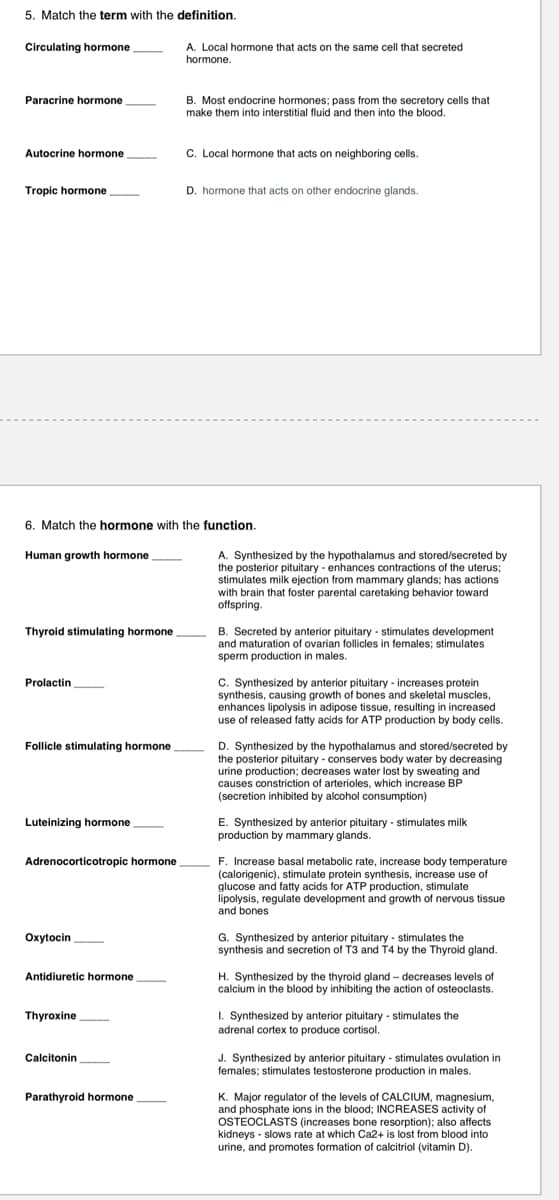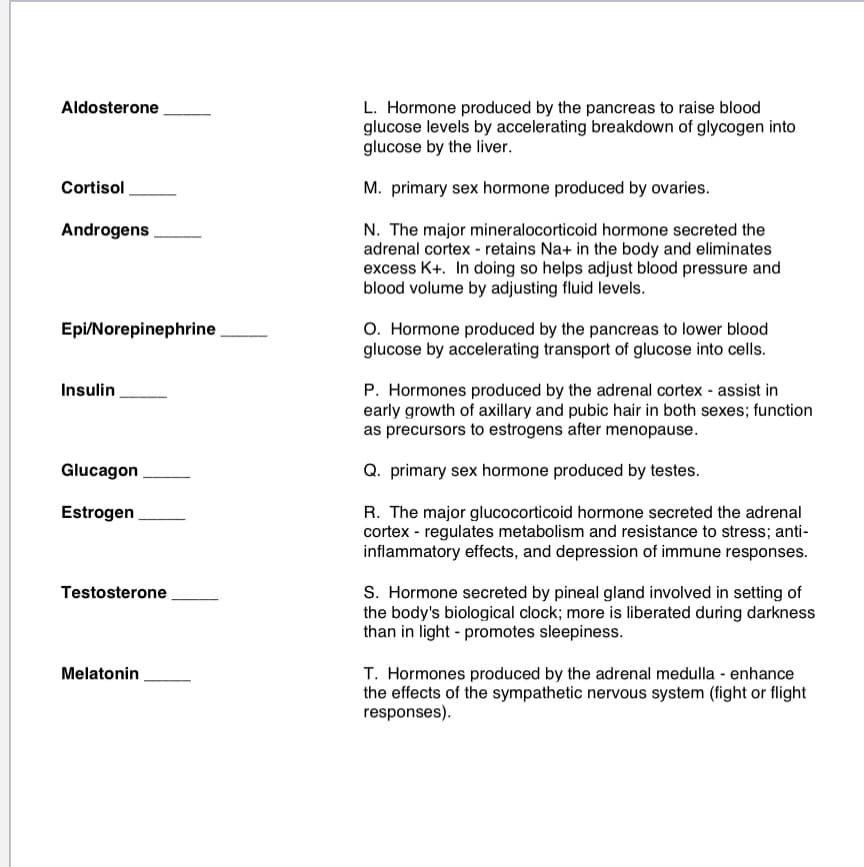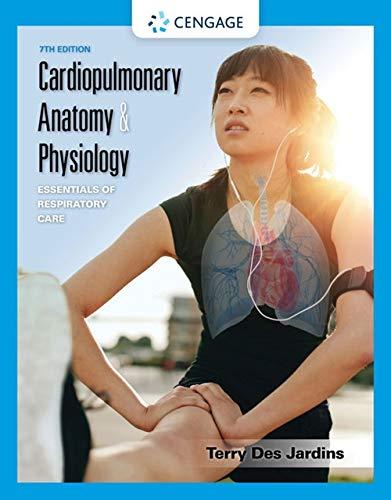5. Match the term with the definition. Circulating hormone A. Local hormone that acts on the same cell that secreted hormone. Paracrine hormone B. Most endocrine hormones; pass from the secretory cells that make them into interstitial fluid and then into the blood. Autocrine hormone C. Local hormone that acts on neighboring cells. Tropic hormone D. hormone that acts on other endocrine glands. 6. Match the hormone with the function. Human growth hormone A. Synthesized by the hypothalamus and stored/secreted by the posterior pituitary - enhances contractions of the uterus; stimulates milk ejection from mammary glands; has actions with brain that foster parental caretaking behavior toward offspring. Thyroid stimulating hormone B. Secreted by anterior pituitary - stimulates development and maturation of ovarian follicles in females; stimulates sperm production in males. C. Synthesized by anterior pituitary -increases protein synthesis, causing growth of bones and skeletal muscles, enhances lipolysis in adipose tissue, resulting in increased use of released fatty acids for ATP production by body cells. Prolactin D. Synthesized by the hypothalamus and stored/secreted by the posterior pituitary - conserves body water by decreasing urine production; decreases water lost by sweating and causes constriction of arterioles, which increase BP (secretion inhibited by alcohol consumption) Follicle stimulating hormone Luteinizing hormone E. Synthesized by anterior pituitary - stimulates milk production by mammary glands. F. Increase basal metabolic rate, increase body temperature (calorigenic), stimulate protein synthesis, increase use of glucose and fatty acids for ATP production, stimulate lipolysis, regulate development and growth of nervous tissue and bones Adrenocorticotropic hormone Oxytocin G. Synthesized by anterior pituitary - stimulates the synthesis and secretion of T3 and T4 by the Thyroid gland. Antidiuretic hormone . H. Synthesized by the thyroid gland - decreases levels of calcium in the blood by inhibiting the action of osteoclasts. Thyroxine I. Synthesized by anterior pituitary - stimulates the adrenal cortex to produce cortisol. J. Synthesized by anterior pituitary - stimulates ovulation in females; stimulates testosterone production in males. Calcitonin Parathyroid hormone K. Major regulator of the levels of CALCIUM, magnesium, and phosphate ions in the blood; INCREASES activity of OSTEOCLASTS (increases bone resorption); also affects kidneys - slows rate at which Ca2+ is lost from blood into urine, and promotes formation of calcitriol (vitamin D).
5. Match the term with the definition. Circulating hormone A. Local hormone that acts on the same cell that secreted hormone. Paracrine hormone B. Most endocrine hormones; pass from the secretory cells that make them into interstitial fluid and then into the blood. Autocrine hormone C. Local hormone that acts on neighboring cells. Tropic hormone D. hormone that acts on other endocrine glands. 6. Match the hormone with the function. Human growth hormone A. Synthesized by the hypothalamus and stored/secreted by the posterior pituitary - enhances contractions of the uterus; stimulates milk ejection from mammary glands; has actions with brain that foster parental caretaking behavior toward offspring. Thyroid stimulating hormone B. Secreted by anterior pituitary - stimulates development and maturation of ovarian follicles in females; stimulates sperm production in males. C. Synthesized by anterior pituitary -increases protein synthesis, causing growth of bones and skeletal muscles, enhances lipolysis in adipose tissue, resulting in increased use of released fatty acids for ATP production by body cells. Prolactin D. Synthesized by the hypothalamus and stored/secreted by the posterior pituitary - conserves body water by decreasing urine production; decreases water lost by sweating and causes constriction of arterioles, which increase BP (secretion inhibited by alcohol consumption) Follicle stimulating hormone Luteinizing hormone E. Synthesized by anterior pituitary - stimulates milk production by mammary glands. F. Increase basal metabolic rate, increase body temperature (calorigenic), stimulate protein synthesis, increase use of glucose and fatty acids for ATP production, stimulate lipolysis, regulate development and growth of nervous tissue and bones Adrenocorticotropic hormone Oxytocin G. Synthesized by anterior pituitary - stimulates the synthesis and secretion of T3 and T4 by the Thyroid gland. Antidiuretic hormone . H. Synthesized by the thyroid gland - decreases levels of calcium in the blood by inhibiting the action of osteoclasts. Thyroxine I. Synthesized by anterior pituitary - stimulates the adrenal cortex to produce cortisol. J. Synthesized by anterior pituitary - stimulates ovulation in females; stimulates testosterone production in males. Calcitonin Parathyroid hormone K. Major regulator of the levels of CALCIUM, magnesium, and phosphate ions in the blood; INCREASES activity of OSTEOCLASTS (increases bone resorption); also affects kidneys - slows rate at which Ca2+ is lost from blood into urine, and promotes formation of calcitriol (vitamin D).
Biology: The Unity and Diversity of Life (MindTap Course List)
15th Edition
ISBN:9781337408332
Author:Cecie Starr, Ralph Taggart, Christine Evers, Lisa Starr
Publisher:Cecie Starr, Ralph Taggart, Christine Evers, Lisa Starr
Chapter34: Endocrine Control
Section: Chapter Questions
Problem 15SQ: Match the term listed at left with the most suitable description at right. _____ adrenal medulla a....
Related questions
Question

Transcribed Image Text:5. Match the term with the definition.
Circulating hormone
A. Local hormone that acts on the same cell that secreted
hormone.
Paracrine hormone
B. Most endocrine hormones; pass from the secretory cells that
make them into interstitial fluid and then into the blood.
Autocrine hormone
C. Local hormone that acts on neighboring cells.
Tropic hormone
D. hormone that acts on other endocrine glands.
6. Match the hormone with the function.
Human growth hormone
A. Synthesized by the hypothalamus and stored/secreted by
the posterior pituitary - enhances contractions of the uterus;
stimulates milk ejection from mammary glands; has actions
with brain that foster parental caretaking behavior toward
offspring.
B. Secreted by anterior pituitary - stimulates development
and maturation of ovarian follicles in females; stimulates
sperm production in males.
Thyroid stimulating hormone
C. Synthesized by anterior pituitary - increases protein
synthesis, causing growth of bones and skeletal muscles,
enhances lipolysis in adipose tissue, resulting in increased
use of released fatty acids for ATP production by body cells.
Prolactin
D. Synthesized by the hypothalamus and stored/secreted by
the posterior pituitary - conserves body water by decreasing
urine production; decreases water lost by sweating and
causes constriction of arterioles, which increase BP
Follicle stimulating hormone
(secretion inhibited by alcohol consumption)
E. Synthesized by anterior pituitary - stimulates milk
production by mammary glands.
Luteinizing hormone
F. Increase basal metabolic rate, increase body temperature
(calorigenic), stimulate protein synthesis, increase use of
glucose and fatty acids for ATP production, stimulate
lipolysis, regulate development and growth of nervous tissue
and bones
Adrenocorticotropic hormone
G. Synthesized by anterior pituitary - stimulates the
synthesis and secretion of T3 and T4 by the Thyroid gland.
Oxytocin
H. Synthesized by the thyroid gland - decreases levels of
calcium in the blood by inhibiting the action of osteoclasts.
Antidiuretic hormone
Thyroxine
I. Synthesized by anterior pituitary - stimulates the
adrenal cortex to produce cortisol.
Calcitonin
J. Synthesized by anterior pituitary - stimulates ovulation in
females; stimulates testosterone production in males.
K. Major regulator of the levels of CALCIUM, magnesium,
and phosphate ions in the blood; INCREASES activity of
OSTEOCLASTS (increases bone resorption); also affects
kidneys - slows rate at which Ca2+ is lost from blood into
urine, and promotes formation of calcitriol (vitamin D).
Parathyroid hormone.

Transcribed Image Text:Aldosterone
L. Hormone produced by the pancreas to raise blood
glucose levels by accelerating breakdown of glycogen into
glucose by the liver.
Cortisol
M. primary sex hormone produced by ovaries.
Androgens
N. The major mineralocorticoid hormone secreted the
adrenal cortex - retains Na+ in the body and eliminates
excess K+. In doing so helps adjust blood pressure and
blood volume by adjusting fluid levels.
O. Hormone produced by the pancreas to lower blood
glucose by accelerating transport of glucose into cells.
Epi/Norepinephrine
P. Hormones produced by the adrenal cortex - assist in
early growth of axillary and pubic hair in both sexes; function
as precursors to estrogens after menopause.
Insulin
Glucagon
Q. primary sex hormone produced by testes.
Estrogen
R. The major glucocorticoid hormone secreted the adrenal
cortex - regulates metabolism and resistance to stress; anti-
inflammatory effects, and depression of immune responses.
S. Hormone secreted by pineal gland involved in setting of
the body's biological clock; more is liberated during darkness
than in light - promotes sleepiness.
Testosterone
T. Hormones produced by the adrenal medulla - enhance
the effects of the sympathetic nervous system (fight or flight
responses).
Melatonin
Expert Solution
This question has been solved!
Explore an expertly crafted, step-by-step solution for a thorough understanding of key concepts.
This is a popular solution!
Trending now
This is a popular solution!
Step by step
Solved in 3 steps

Knowledge Booster
Learn more about
Need a deep-dive on the concept behind this application? Look no further. Learn more about this topic, biology and related others by exploring similar questions and additional content below.Recommended textbooks for you

Biology: The Unity and Diversity of Life (MindTap…
Biology
ISBN:
9781337408332
Author:
Cecie Starr, Ralph Taggart, Christine Evers, Lisa Starr
Publisher:
Cengage Learning

Biology (MindTap Course List)
Biology
ISBN:
9781337392938
Author:
Eldra Solomon, Charles Martin, Diana W. Martin, Linda R. Berg
Publisher:
Cengage Learning

Essentials of Pharmacology for Health Professions
Nursing
ISBN:
9781305441620
Author:
WOODROW
Publisher:
Cengage

Biology: The Unity and Diversity of Life (MindTap…
Biology
ISBN:
9781337408332
Author:
Cecie Starr, Ralph Taggart, Christine Evers, Lisa Starr
Publisher:
Cengage Learning

Biology (MindTap Course List)
Biology
ISBN:
9781337392938
Author:
Eldra Solomon, Charles Martin, Diana W. Martin, Linda R. Berg
Publisher:
Cengage Learning

Essentials of Pharmacology for Health Professions
Nursing
ISBN:
9781305441620
Author:
WOODROW
Publisher:
Cengage

Cardiopulmonary Anatomy & Physiology
Biology
ISBN:
9781337794909
Author:
Des Jardins, Terry.
Publisher:
Cengage Learning,

